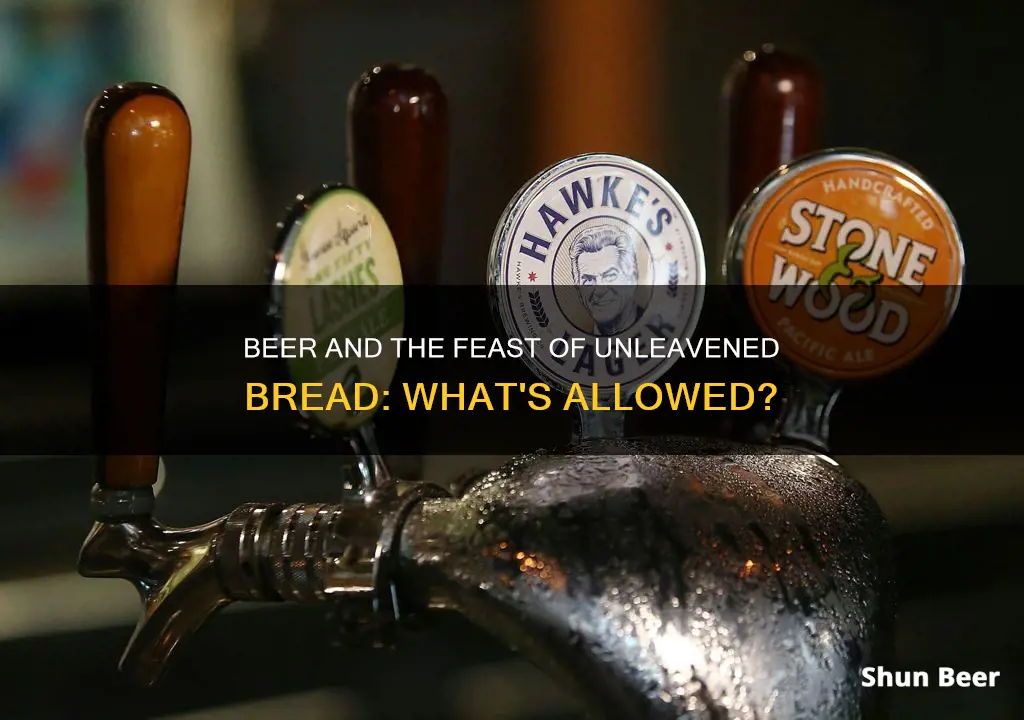
The Feast of Unleavened Bread is a seven-day festival during which people are instructed to eat unleavened bread and remove leaven and leavened products from their homes. The question of whether beer can be consumed during this period is a complex one and depends on the interpretation of the festival's rules. Beer contains live yeast cells, which are the same type of yeast used to make bread. Therefore, some people argue that beer should be avoided during the Feast of Unleavened Bread as it contains a leavening agent. However, others argue that the rules only prohibit leavened bread and not other leavened products like beer. Ultimately, it is up to each individual to decide whether to consume beer during the festival, based on their own interpretation of the Bible and the facts.
What You'll Learn

Leavened vs. Leavening
Leavening refers to the process of creating and trapping gases in dough so that it rises. This can be done through chemical or biological reactions. Leavened products refer to those that have undergone this process and are therefore risen.
Chemical leavening agents, such as baking soda, react with acids in the dough to produce carbon dioxide, and are typically used in crackers and cakes. On the other hand, biological leavening agents like yeast are single-cell micro-organisms that eat sugar in the dough and secrete an enzyme called zymase, which converts the sugar into carbon dioxide and alcohol, causing the dough to rise.
During the Feast of Unleavened Bread, both leaven and leavened products are prohibited. This includes yeast, as it is a leavening agent, and bread crumbs, as they are a leavened product. However, there is some ambiguity regarding the consumption of beer during this feast.
Beer is made through the fermentation of grains, typically barley, which is one of the five grains (along with wheat, rye, oats, and spelt) that are prohibited from being leavened during the feast. Beer contains live yeast cells, which are the same type of yeast used in bread-making. Therefore, some people argue that beer should be avoided during the Feast of Unleavened Bread.
However, others argue that the yeast in beer is not the same as the yeast used in bread-making and that beer is more similar to fruit wine, which is allowed during the feast. They claim that the yeast in beer is not grown on chametz (leavened bread) and therefore may be permitted. Additionally, the Talmud suggests that the concern for chametz during this feast was restricted to solid foods like sandwiches and not beverages like beer.
Ultimately, the decision to consume beer during the Feast of Unleavened Bread is a matter of individual interpretation and adherence to specific religious traditions.
Honey's Magic in Beer: The Science Behind It
You may want to see also

Live yeast cells in beer
Live yeast cells are essential in the production of beer. Yeast is a single-celled fungus used in baking, wine, beer fermentation, and basic cell biology research. The yeast cells are small, about 0.010 mm (10 microns), and require a microscope to be seen and counted.
The process of beer production involves several stages, starting with the aerobic stage or lag phase, where the yeast acclimatizes to the new environment's temperature, specific gravity, pH, wort composition, and dissolved oxygen level. This is followed by the logarithmic or log phase, where the yeast undergoes asexual reproduction through a process called budding, resulting in exponential growth. The final stage is the anaerobic stage, where yeast starts producing carbon dioxide and alcohol once the available oxygen is used up.
Yeast plays a crucial role in converting sugars from the malt into carbon dioxide and ethanol through fermentation. The yeast then settles at the bottom of the vessel and is later removed. The young beer is cooled and stored to allow the flavor to mature.
The viability and health of yeast cells are critical for the beer-making process. Factors such as oxygen availability, nutrient signaling pathways, and the genetic background of the yeast strain can influence the chronological life span of yeast, impacting its ability to survive and function during fermentation.
Additionally, yeast cells undergo a process called budding, a form of asexual reproduction, which is essential for their growth and survival. This process results in the formation of a birth-scarred mother cell and a scar-free daughter cell. The mother cell can produce multiple daughter cells, contributing to the exponential increase in the yeast population.
Overall, live yeast cells are crucial for beer fermentation, and their health and viability significantly impact the final product's quality and flavor.
Drinking Beer Outside: Legal or Not?
You may want to see also

Beer is not bread
The question of whether beer can be consumed during the Feast of Unleavened Bread is a complex one, and it depends on how one interprets the religious guidelines. Some people may argue that since wine is allowed during this feast, beer should also be permissible. However, there are significant differences between wine and beer that need to be considered.
Firstly, wine is made from the fermentation of grape juice, while beer is produced using grains, typically barley or wheat. The process of making bread and beer has many similarities, and both involve the use of yeast to convert sugars into carbon dioxide and alcohol. However, it is important to note that during the baking process, a large percentage of the alcohol in the bread dough evaporates, resulting in only trace amounts of alcohol remaining in the final product. In contrast, beer still contains yeast that is alive and active, and it is this yeast that contributes to the leavening process, resulting in a lighter and fluffier texture.
The key distinction between bread and beer lies in the presence of live yeast and the resulting leavening effect. During the Feast of Unleavened Bread, the focus is on avoiding leavened products, which are often associated with "puffed-up foods." The intention is to deprive oneself of the means to produce and consume foods with a puffed-up texture. While bread can be leavened, resulting in a softer and more elastic texture, it is not a requirement, and unleavened bread is also commonly consumed. In contrast, beer inherently contains live yeast, which is essential for the fermentation process and contributes to the carbonation and flavor of the beverage.
Therefore, when considering the guidelines for the Feast of Unleavened Bread, it is important to understand the intentions behind the instructions. The focus is on avoiding leavened products, and yeast is specifically mentioned as something to be eliminated during this period. Beer, being a product that relies on live yeast for its production and containing yeast cells that can spring into activity, would fall under the category of something to be avoided. Thus, the argument that "beer is not bread" can be made in the context of the Feast of Unleavened Bread, as the presence of live yeast in beer distinguishes it from unleavened bread and aligns it more closely with leavened products.
Additionally, the historical context is important to consider. In biblical times, the only use for yeast was to raise dough, and the Israelites had no knowledge of beer. The instructions given by God focused on this specific use of yeast, and the intention was to avoid any products that could create a puffed-up texture. While modern times have brought new uses for yeast, including in the production of beer, the underlying principle of avoiding leavened products remains relevant.
In conclusion, while the question of consuming beer during the Feast of Unleavened Bread is open to interpretation, a strong case can be made that "beer is not bread." The presence of live yeast in beer, its contribution to the leavening process, and the historical context of the religious guidelines suggest that beer should be avoided during this feast.
Beer Consultation: A Guide to the Process
You may want to see also

Fermented beverages are okay
The consumption of fermented beverages during the Feast of Unleavened Bread is a topic of debate among religious scholars and practitioners. While some argue that only leavened bread is prohibited during this period, others provide a more nuanced interpretation. Here are several paragraphs that delve into the perspective that fermented beverages are permissible:
The Feast of Unleavened Bread, a week-long festival, is marked by the consumption of unleavened bread and the removal of leaven and leavened products from our homes. The Bible provides clear instructions to "eat unleavened bread" and eliminate "leavened products" and "leavening agents" from our surroundings. This distinction between "leavened" and "leavening" is crucial to understanding the permissibility of fermented beverages.
Leavened products refer to those that have already undergone fermentation and contain carbon dioxide and alcohol. On the other hand, leavening agents are substances that have the potential to cause fermentation but may not have been activated yet. This includes yeast, which is a biological leavening agent, and baking soda, which is a chemical leavening agent.
When examining the consumption of fermented beverages, it's essential to consider the type of beverage and its production process. Wine, for example, is produced by fermenting the natural yeasts found on grape skins. This process occurs in the absence of oxygen and results in a higher alcohol content compared to bread-making. Interestingly, wine is not only permitted during the Feast of Unleavened Bread but is an integral part of the celebration, with participants being obliged to drink at least four cups during the Passover Seder.
The Torah refers to the holiday of Pesach as Chag HaMaztos, or the Holiday of Matzah, where matzah is defined as unleavened bread made from specific grains. The Torah prohibits the consumption or ownership of leavened bread, referred to as Chometz, during Pesach. However, it's important to note that yeast itself is not considered Chometz. If yeast is not grown on Chometz, it may be permitted during the feast.
Beer, on the other hand, presents an interesting question. While barley beer is considered Chometz, as it involves fermenting one of the five major grains, fruit beer or fruit wine is a different matter. In the Talmud, it is noted that the concern for Chometz in a beer cellar was restricted to sandwiches and not the beer itself. Fruit beer is produced by fermenting the natural sugar in fruits using yeast, resulting in a product that has the potential to be Kosher for Pesach, depending on the origin of the yeast.
In conclusion, while the consumption of leavened bread is prohibited during the Feast of Unleavened Bread, the interpretation of whether fermented beverages are permissible is more complex. Wine and certain types of beer, such as fruit beer, that use yeast not grown on Chometz may be allowed. However, it is always advisable to refer to religious authorities and scholars for definitive guidance on this matter.
Beer and Amoxicillin: Is It Safe to Drink?
You may want to see also

Beer and the Torah
The Torah refers to the holiday of Pesach as Chag HaMaztos, or the Holiday of Matzah (unleavened bread). During this time, the Torah prohibits the eating, owning, or benefiting from Chometz, or leavened bread. The Torah also prohibits Se'or, a leavening agent or sourdough starter.
The question of whether or not beer is permissible during the Feast of Unleavened Bread is a complex one. On the one hand, beer does contain live yeast cells, which are the same type of yeast used to make bread. This would suggest that beer should be avoided during the feast, as it contains a leavening agent.
However, the Talmud makes a distinction between different types of beer. Barley beer, which is the most common type, is considered Chometz and should be avoided. On the other hand, fruit beer is considered fruit wine, where the natural sugar in the fruit is fermented with yeast, and this type of beer may be permissible if the yeast is acceptable.
Some sources suggest that the intention behind the prohibition of leavened products during the Feast of Unleavened Bread is to deprive people of the means to produce and consume puffed-up foods. In this case, the argument could be made that as long as the beer does not contain yeast that can be used for leavening, it may be permissible.
Ultimately, the decision of whether or not to consume beer during the Feast of Unleavened Bread is a personal one, and individuals should make their decision based on their interpretation of the Bible and the facts, rather than simply following tradition.
Antacids and Beer: A Safe Mix?
You may want to see also
Frequently asked questions
No, as beer contains live yeast cells, which are prohibited during the feast.
The Feast of Unleavened Bread is a week-long festival during which people remove leaven and leavened products from their homes and eat unleavened bread.
Leavened products are those that have been allowed to ferment. This includes bread crumbs and yeast.
The yeast used in the beer-making process is the same as that used in bread-making. Therefore, as yeast is considered leavening, beer is prohibited during the feast.







